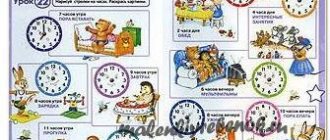Cultivating politeness: something about magic words
Having polite communication skills, it is easy to resolve a controversial issue, find a compromise, and establish good relationships with other people. The sooner you start teaching politeness to your child, the better.
But some children easily learn these norms, while others find it difficult. Child psychologist Ekaterina Georgievna Fedyukina will help you figure out why this happens and how to raise a child to be a polite person.
What is politeness and why is it so important? Are these just rules that adults constantly demand children to follow?
Politeness is one of the most important qualities of a well-mannered person. Until the 16th century, the word “vezha” meant “expert” - one who knows the rules of decency, forms of expressing good attitude towards people.
Being polite and well-mannered in our world is necessary, since politeness is an integral part of goodwill, and it is present in all cultures.
We use polite words to avoid hurting someone else's feelings, to soften the meaning of words that seem harsh or straightforward, to ask for something in a way that makes it easy for the other person to agree. And just to be educated.
Politeness is not just about using the words “sorry”, “please”, “thank you”. While these words are important, politeness means much more. This is the sum of actions that determine a person’s internal culture.
A person's actions clearly indicate whether he is polite or rude. Politeness shows our respect for other people, whether we like them or not. Every person deserves to be treated with courtesy. When you are rude or otherwise show impoliteness, you are demonstrating your disrespect. And then there is nothing to be surprised if a person is offended!
A polite, well-mannered child is the pride of parents and the joy of others. How to teach a child to be polite?
To do this, it is necessary, first of all, to form an idea of the basic rules of behavior in society.
For example, a child should know that in a theater during a performance he must be quiet, not rustle with candy wrappers and not play with musical toys. In a store or clinic, you need to calmly walk along the corridor, and not run, scream or crawl on the floor. When playing in the sandbox, you must not take toys away from your playing partners, fight or bully other children.
If the basic rules of behavior in society are not instilled in a child from early childhood, then it will be very difficult to catch up and teach the child politeness. If you do not want your child to become an ill-mannered teenager, and then an adult, start teaching your child politeness from an early age.
It is parents who should be an example of politeness and decent behavior in society for their child.
Watch your behavior. If your goal is to get your baby to thank you for the gifts yourself. Let your child observe your interactions with others and gradually understand that this is normal.
You can also draw his attention to the communication of other people with each other - and there should be both a negative example and a positive one. Naturally, each situation must be accompanied by appropriate comments.
Good manners should not be reserved for welcoming guests or for special occasions. Your child must understand that you must always be polite, even if he is alone with his mother.
It makes sense to distinguish between the child’s communication style with adults and with peers. If you can use some “peculiar” expressions when communicating with peers, this should be taboo when talking with adults.
Here are some reminders for parents to help teach their child politeness:
- Be sure to use polite words yourself in situations where they are necessary.
- Show your child the “magic” of polite words: do not fulfill his requests, for example, “give me”, without the word “please.”
- Be the first to say hello, goodbye and thank you, without waiting for the child to remember.
- Together with your child, develop and approve mandatory rules of politeness. For example: “You need to say hello to everyone you know whom you saw for the first time that day.”
- Teach politeness politely!
When trying to teach a child politeness, you need to make him understand that every person is sometimes wrong. And you need to be able to ask for forgiveness for your wrong actions. Moreover, the apology should not mean that the child is bad.
An apology is just an indication that he is wrong and regrets it. And it is not at all necessary that the person to whom your child apologizes will treat him worse later.
Young children often interrupt each other and adults and butt into the conversation, which is also a manifestation of impoliteness.
The first words, the first phrases... How happy we are that the child can speak!
Time passes, and we notice that the baby has not only learned to talk to adults, he has learned to interrupt adults.
You need to know that when a child interrupts an adult or gets into a conversation without asking, this can mean a lot. For example, that he does not know how to listen or shows aggression towards the one whom he interrupted, or perhaps he wants to attract attention to himself, to which he is accustomed, being the center of the family universe, or, conversely, does not receive enough parental attention.
The manifestation of extreme impatience is typical for children with increased nervous tension. When a child talks a lot, interferes in the conversations of adults and other children, and invades other people's games, this may be one of the symptoms of hyperactivity.
Children often demand immediate attention from their parents. In this case, you need to teach them patience and develop the ability to wait.
We can recommend the following rules to teach your child not to interrupt adults:
- Ask to remember what the child wants to tell you so that you can listen to him when you finish the conversation.
- Do not use phrases such as: “Only bad children do this,” “You are rude, ill-mannered, butting into someone else’s conversation.”
- Teach how to politely interrupt a conversation. Phrase: “Please excuse me for interrupting you!” – can become truly magical.
- Set an example for your child and don’t get involved in someone else’s conversation unless necessary.
- Consider age: the younger the child, the more difficult it is for him to restrain himself in anticipation of a pause in the conversation.
- Praise your child for finding something to do while you were busy talking.
- Never interrupt your child yourself!
What should you consider when explaining the rules of politeness to a small child?
Firstly, do this not in the form of notations, but when there is a reason.
Secondly, speak in a language that the baby understands, and do not forget to give reasons. The child wants to know why he needs to behave this way.
Thirdly, accompany each prohibition with permission.
The easiest way to teach a child the rules of behavior in society is in a form that is accessible and interesting to him – in a playful manner. Poems and stories about politeness for children will be an indispensable tool in developing good habits.
Books about politeness for children should be colorful, bright, memorable and associated with specific images.
An excellent example of this is Samuel Marshak’s poem “A Lesson in Politeness,” where the basic rules of behavior are explained using the example of a bear cub. A child does not think abstractly, therefore, in order to convey information to him, you need to specify the situation.
While listening to the text, he must “draw” everything that happens in it in his head.
It is necessary not only to read poetry together and memorize it, but also to have conversations. Even with the smallest child you need to discuss what you read. This is the only way parents will be able to understand that the baby understood the meaning correctly.
At the end of the conversation, the child should have a complete picture of what is happening and his own opinion about the situation. An excellent choice would be poems about politeness for children by S. Marshak, A. Barto and A. Kondratiev.
A game for a child is one of the effective ways to show him the good sides of communication and solving small, childish, but no longer quite simple problems.
To play polite with your child, you will need various toys that you have at home. There can be many plots for the game, because you need to be polite in different ways in different situations.
Teaching your children to be polite is the task of parents. And this process must begin as early as possible. Moreover, it is very important not only to teach the child to say the right words and perform the right actions, but also to essentially be polite.
E. G. Fedyukina Magazine for parents “Grapes”, No. 5 (61), 2014






